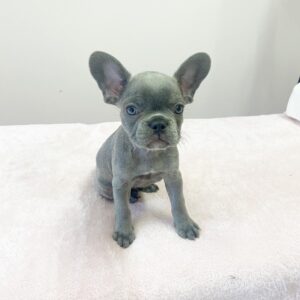Description
Curious about the charming world of Blue French Bulldogs? These unique pups stand out with their striking blue coat, captivating eyes, and playful demeanor. While they may look similar to traditional Frenchies, these rare beauties boast a distinct and eye-catching color palette that sets them apart from the rest. Dive into this post to uncover everything you need to know about these adorable yet unusual companions – from their personality traits to care tips and where to find them. Get ready to explore the enchanting universe of Blue French Bulldogs like never before!
History of Blue French Bulldogs
Genetic Mutation
Blue French Bulldogs are a unique breed that originated from a rare genetic mutation. This mutation is responsible for the distinctive blue coat color that sets them apart from other French Bulldog variations. The presence of this gene gives these dogs their striking blue color.
Blue French Bulldogs have become highly sought after due to their unusual coloring, making them quite popular among dog enthusiasts and breeders alike. Despite being relatively new compared to other bulldog breeds, they have quickly gained popularity for their distinct look and charming personalities.
Early Origins
The history of Blue French Bulldogs can be traced back to the early 19th century in France. During this time, breeders began developing these dogs with the aim of creating a smaller companion breed with unique characteristics. These early breeding efforts laid the foundation for what would eventually become known as the Blue French Bulldog.
Originally bred as companion animals for lace workers in Nottingham, England, these dogs quickly became beloved pets due to their friendly nature and compact size. Over time, they gained recognition not only for their companionship but also for their striking blue coat color that distinguishes them from other bulldog breeds.
Understanding Blue French Bulldog Colors
Unique Coat Color
Blue French Bulldogs are known for their unique coat color, which is caused by a dilution gene. This gene affects the pigmentation of their fur, resulting in shades of blue not commonly seen in other dog breeds. The distinctive aspect of this coloration sets them apart from traditional coat colors found in French Bulldogs.
These dogs exhibit a range of blue hues, varying from a light grayish-blue to a deep steel blue shade. Each Blue French Bulldog can have its own specific shade within this spectrum, making them even more special and sought after among dog enthusiasts. The depth and richness of the blue color can vary among individual dogs, adding to the allure and uniqueness of each one.
Popularity Among Breed Enthusiasts
The blue coat color is highly coveted within the community of French Bulldog breeders and owners. Due to its rarity and striking appearance, Blue French Bulldogs are often considered prized possessions by those who admire the breed’s distinct characteristics. Their popularity stems not only from their physical appearance but also from the exclusivity associated with owning a dog with such an uncommon coat color.
-
Pros:
-
Unique and eye-catching coat color
-
Highly sought after by breed enthusiasts
-
Cons:
Blue French Bulldog Characteristics
Compact and Muscular Build
Blue French Bulldogs are known for their compact and muscular build. They have a sturdy frame that gives them a robust appearance. Despite their small size, they exhibit strength and agility, making them excellent companions for various activities.
These dogs possess a unique physique that sets them apart from other breeds. Their well-defined muscles contribute to their overall athletic look, reflecting their energetic nature. The distinct physical characteristics of Blue French Bulldogs make them stand out in any setting.
Distinctive Features
One of the most recognizable features of Blue French Bulldogs is their “bat-like” ear shape. These erect ears add to their charm and playfulness, enhancing their adorable appearance. They boast a short and smooth coat that requires minimal grooming but still gives them an elegant look.
The combination of these distinctive features contributes to the breed’s popularity among dog enthusiasts worldwide. The charming ear shape coupled with the sleek coat makes Blue French Bulldogs instantly appealing to anyone who encounters them.
Blue French Bulldog Temperament
Playful and Outgoing
Blue French Bulldogs are known for their lively and friendly nature. They enjoy playing and interacting with their owners, making them excellent companions for families. These dogs often exhibit a cheerful demeanor, bringing joy and laughter to those around them.
They have an outgoing personality that shines through in various situations. Whether it’s playtime at the park or cuddling on the couch, Blue French Bulldogs are always ready to engage and have fun. Their playful nature makes them popular pets among individuals seeking a lively and entertaining companion.
Well-Behaved and Social
One of the remarkable traits of Blue French Bulldogs is their good behavior. They are typically well-mannered dogs that respond well to training. This breed is known for being obedient, making them easy to handle in different environments.
Moreover, Blue French Bulldogs tend to be social animals that get along well with other pets. Whether it’s another dog or a cat in the household, these dogs usually form harmonious relationships with their furry friends. Their sociable nature adds to their charm as pets suitable for multi-pet households.
Blue French Bulldogs and Children
Good Temperament
Blue French Bulldogs are known for being good with children, making them ideal family pets. Their patient and tolerant nature suits households with kids well. Even though they are generally gentle, supervision is crucial when young children interact with any dog breed.
Blue Frenchies have a playful side that matches the energy of children. They enjoy running around in the yard or playing fetch indoors. This active engagement can create strong bonds between the dog and the child, fostering a loving relationship.
Safety First
Safety should always be a priority. Teaching children how to properly handle and respect their furry friend is essential for both parties’ well-being. Simple guidelines like not pulling on ears or tails can prevent accidents and ensure a harmonious coexistence.
Moreover, establishing boundaries early on helps dogs understand expectations within the family unit. Consistent training reinforces positive behaviors while discouraging negative ones, creating a safe environment for both kids and pets to thrive together.
Health Concerns in Blue French Bulldogs
Brachycephalic Syndrome
Blue French Bulldogs, like their counterparts, are susceptible to health issues such as brachycephalic syndrome. This condition is common in breeds with short skulls and can lead to breathing difficulties and other respiratory problems. Due to their unique facial structure, blues may experience challenges regulating their body temperature efficiently.
Regular veterinary visits are crucial for monitoring the overall well-being of blue French Bulldogs. Vets can assess any signs of brachycephalic syndrome early on and provide necessary interventions. Owners should be vigilant about symptoms like noisy or labored breathing, excessive snorting, or difficulty exercising.
Breathing Difficulties
The distinctive feature of a short snout in blue French Bulldogs can result in breathing difficulties due to narrow nostrils or elongated soft palates. These anatomical abnormalities make it harder for them to breathe properly, especially during physical activities or when stressed. It’s essential for owners to keep an eye out for any signs of respiratory distress and seek immediate veterinary attention if observed.
To alleviate breathing issues in blue French Bulldogs, some may require surgical procedures like widening the nostrils (nares) or shortening the soft palate. These corrective surgeries aim to enhance airflow and improve their quality of life by reducing respiratory distress episodes.
Lifespan of Blue French Bulldogs
Average Lifespan
Blue French Bulldogs typically live for 10 to 12 years. Proper care, nutrition, and exercise play crucial roles in determining their lifespan. These factors can significantly impact the longevity of blue French Bulldogs.
Taking good care of your blue French Bulldog is essential to ensure they live a long and healthy life. Regular vet check-ups, a balanced diet, and ample exercise are key components that contribute to their overall well-being and can help extend their lifespan.
Factors Influencing Longevity
While the average lifespan falls between 10 to 12 years, some blue French Bulldogs may surpass this range if they are fortunate enough not to encounter significant health issues throughout their lives. Genetics also play a role in determining how long these dogs will live.
Cost of Blue French Bulldog Puppies
Factors Influencing Price
Blue French Bulldog puppies are typically pricier compared to their counterparts with different coat colors. The cost variation is influenced by several factors such as lineage, pedigree, and the reputation of the breeder. For instance, a blue Frenchie with a champion bloodline will command a higher price due to its prestigious lineage.
When considering purchasing a blue French Bulldog, it’s crucial to understand that reputable breeders often charge more for their puppies. These breeders invest in ensuring the health and well-being of their dogs, which can reflect in the pricing. Reputable breeders adhere to breeding standards and practices that contribute to producing high-quality puppies.
Importance of Researching Breeders
Researching and selecting a reputable breeder is paramount when looking into getting a blue French Bulldog puppy. Reputable breeders prioritize the overall health and temperament of their dogs over profit margins. By choosing an ethical breeder, you not only ensure that you are getting a healthy puppy but also support responsible breeding practices.
One way to identify reputable breeders is through reviews from previous customers or referrals from trusted sources like veterinarians or local kennel clubs. A responsible breeder will be transparent about the dog’s lineage, provide necessary health clearances, and offer guidance on caring for your new blue Frenchie.
Pros:
-
High-quality lineage leads to healthier puppies.
-
Reputable breeders follow ethical breeding practices.
-
Supportive guidance on raising your blue French Bulldog.
Cons:
-
Higher initial cost compared to other coat colors.
-
Limited availability due to selective breeding practices.
Rarity and AKC Recognition of Blue French Bulldogs
Rarity of Blue French Bulldogs
Blue French Bulldogs are highly sought after due to their unique coat coloration, which sets them apart from the traditional colors seen in this breed. The rarity of these dogs adds to their appeal for many prospective owners. Despite being a popular choice, finding a blue Frenchie can be challenging due to their limited availability compared to other coat colors.
-
Pros:
-
Unique and eye-catching appearance
-
High demand among dog enthusiasts
-
Cons:
-
Limited availability
-
Potential higher cost due to rarity
AKC Recognition and Variations in Standards
The American Kennel Club (AKC) officially recognizes blue French Bulldog as part of the breed standard, acknowledging them as legitimate representatives of the breed. This recognition provides validation for both breeders and owners who appreciate these unique dogs. However, it’s important to note that while the AKC accepts blue-coated French Bulldogs, some kennel clubs may have differing standards or restrictions regarding acceptable coat colors within the breed.
-
Some kennel clubs might not recognize blue as an accepted color variation.
-
Breeders adhering strictly to certain club standards may focus on breeding only traditional-colored French Bulldogs.
When selecting a blue French Bulldog puppy, potential owners should consider researching different kennel clubs’ standards if they have specific preferences regarding coat color variations within this beloved breed.
Closing Thoughts
You’ve delved deep into the world of Blue French Bulldog, uncovering their history, colors, characteristics, temperament, interactions with children, health concerns, lifespan, pricing, and rarity. Remember, owning a Blue French Bulldog isn’t just about having a pet; it’s about welcoming a loyal companion into your life. Ensure you prioritize their well-being and provide a loving environment for these unique fur babies.
So, whether you’re considering adding a Blue French Bulldog to your family or simply expanding your knowledge on this fascinating breed, keep in mind that each of these dogs has its quirks and needs. Stay informed, be prepared for the responsibilities that come with pet ownership, and most importantly, shower your Blue Frenchie with all the love and care they deserve.
Frequently Asked Questions
Are blue French Bulldogs a separate breed from regular French Bulldogs?
Blue French Bulldogs are not a separate breed but rather a color variation of the traditional French Bulldog. The unique blue coat color in these dogs is achieved through specific genetic factors.
Do Blue French Bulldogs, pure breed frenchies, have any specific health concerns related to their coat color?
Yes, Blue French Bulldogs may be more prone to certain health issues such as skin allergies and alopecia due to their genetic makeup that causes the blue coat color. Regular vet check-ups are essential for monitoring their health.
How do the temperaments of Blue French Bulldog, pure breed frenchies, differ from standard-colored ones?
In terms of temperament, Blue French Bulldogs exhibit similar characteristics to regular ones – they are known for being affectionate, playful, and loyal companions. However, individual personalities can vary regardless of coat color.
What makes Blue French Bulldogs popular among dog owners?
The unique and striking appearance of Blue French Bulldogs sets them apart and attracts many dog enthusiasts. Their charming personality traits combined with the rareness of their coloring make them highly sought after in the canine world.
Are there any special considerations when raising a Blue French Bulldog around children?
While generally good with kids due to their friendly nature, supervision is crucial when introducing any dog breed to children. Teaching kids how to interact safely with pets ensures a harmonious relationship between your family and your furry friend.








